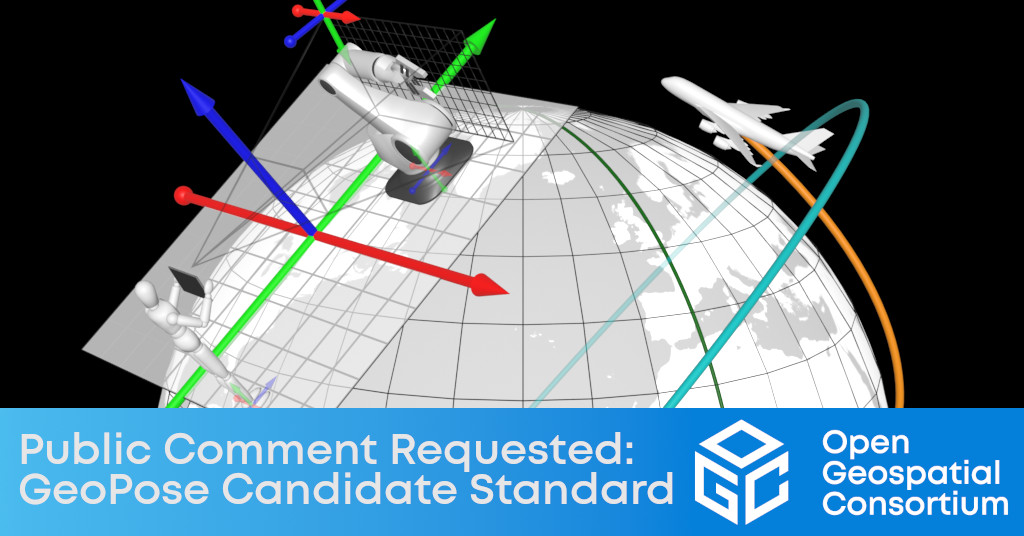Subscribe to our Press Release
Subscribe here to receive future Press Releases by email: Subscribe
info [at] ogc.org
OGC GeoPose provides an interoperable way to express, record, and share the position and orientation of objects across diverse applications, users, devices, services, and platforms.
The Open Geospatial Consortium (OGC) seeks public comment on the candidate OGC GeoPose Standard, which provides a standard for expressing and sharing geographically-anchored poses (aka GeoPoses) of objects with six degrees of freedom and referenced to one or more standardized Coordinate Reference Systems. Comments are due by November 15, 2021.
The combination of position (e.g. x, y, z or longitude, latitude, elevation) and orientation (e.g. pitch, roll, and yaw) with 6 degrees of freedom for objects in computer graphics and robotics is usually referred to as the object’s “pose.” Pose can be expressed as being in relation to other objects, a place, and/or to the user. When a pose is defined relative to the Earth, it is called a geographically anchored pose, or ‘GeoPose’ for short.
The ability to specify and express the GeoPose of any object will aid in interoperability between 3D spatial computing systems such as those for autonomous vehicles, augmented, virtual, and extended reality (AR/VR/XR), 3D map visualization, or any digital representation of the physical world or part therein, such as digital twins. Further, the ability to express the GeoPose of an object will aid applications involving Earth Observation from spacecraft and aircraft with sensors mounted on rotatable gimbals.
Prior to the OGC’s development of the GeoPose Standard, all geospatially anchored poses were proprietary. This has resulted in unnecessary difficulty when sharing GeoPose information between systems. With OGC GeoPose it will be possible to universally express any physical or digital object’s GeoPose in a manner that can be interpreted and used across the range of modern computing platforms and devices. Physical objects may include AR display devices (being a proxy for a user’s eyes), vehicles, robots, or even a park bench, while digital objects may include a BIM model, a computer game asset, the origin and orientation of the local coordinate system of an AR device, or a point-cloud dataset.
The candidate OGC GeoPose Standard specifies eight standardization targets: two “Basic” forms with no configuration options, for common use cases, an “Advanced” form with more flexibility for more complex applications, and five composite structures that support time series plus chain and graph structures. The candidate GeoPose Standard is modular, flexible, and designed to suit a range of applications and use cases and enable the exchange of GeoPose information between them.
OGC Members interested in staying up to date on the progress of this standard, or contributing to its development, are encouraged to join the GeoPose SWG via the OGC Portal or follow the OGC GeoPose GitHub repository.
The candidate GeoPose standard is available for review and comment on the OGC Portal. Comments are due by November 15, 2021, and should be submitted by creating an issue in the OGC GeoPose GitHub Repository.
About OGC
The Open Geospatial Consortium (OGC) is a collective problem-solving community of experts from more than 500 businesses, government agencies, research organizations, and universities driven to make geospatial (location) information and services FAIR – Findable, Accessible, Interoperable, and Reusable.
The global OGC Community engages in a mix of activities related to location-based technologies: developing consensus-based open standards and best-practice; collaborating on agile innovation initiatives; engaging in community meetings, events, and workshops; and more.
OGC’s unique standards development process moves at the pace of innovation, with constant input from technology forecasting, practical prototyping, real-world testing, and community engagement.
OGC bridges disparate sectors, domains, and technology trends, and encourages the cross-pollination of ideas between different communities of practice to improve decision-making at all levels. OGC is committed to creating an inclusive and sustainable future.
Visit ogc.org for more info on our work.
